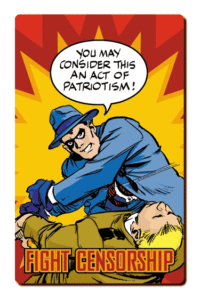KCRW ran a story on the indecency wars this morning, and quoted someone who was concerned that kids are picking up bad language from broadcast media.
Yeah, right. Broadcast media is so locked down they can’t find that kind of language there.
When I was in middle school, I spent a week working at a cub scout day camp. I think I was around 12 or 13 at the time. The adults warned us that we had to watch our language around the cubs (who were probably around 8 or 9), because they didn’t want the kids picking up any bad words from us. They needn’t have bothered. The kids were far more foul-mouthed around us than we were amongst ourselves, and actually managed to shock us. This was in the late 1980s.
Kids don’t need TV or movies to learn bad words. They learn them from their friends at school, or they learn them from parents, or from neighbor kids.
There was a B.C. comic strip a few years ago that I thought illustrated this point well: Two kids (well, ants) walk into the room, one crying, “Mom, he said the Z-word!” The parents send the kid to his room, then have this brief conversation: “Where’d the little %@#&! learn the Z-word?” “Beats the #@*$ out of me.”
